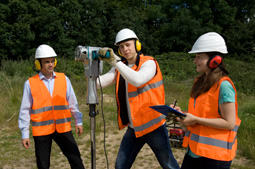Civil Engineering and Management

Civil Engineering and Management
A Bachelor degree that combines civil engineering with economics

What you can expect
Students on the "Industrial Engineering and Construction" program learn how to efficiently plan, monitor and financially manage construction projects. This program combines civil engineering with business management aspects. It covers both the technical and financial aspects of the construction industry.
The program teaches traditional civil engineering techniques such as planning and construction management, while at the same time students acquire knowledge of financial management and business strategies. The aim is to train specialists who are able to successfully implement construction projects and master the financial challenges of the construction industry.
After graduating with a Bachelor's degree, graduates have the opportunity to enter the world of work directly or to deepen their qualifications with a Master's degree. This course offers a wide range of prospects in the construction industry.
Excursions
- Company visits
- Insights into practice
- Imparted knowledge in application
Dual study
Combine your passion for civil engineering and management with practice-oriented learning through our dual study program
The land has been acquired. The buildings are planned. Offices for employees, sufficiently large production halls, areas for roads and tracks or enough rooms for your own home. Which and how many building materials are needed? Does anyone have an eye on the costs? Won't the whole thing exceed the budget? Who has actually estimated how and when? And who thinks about follow-up costs? Is the design really optimal or should several alternatives have been investigated at the outset?
In the best case scenario, there will be an industrial engineer specializing in construction in the ranks of those involved in the construction who can provide advice and support. Someone who can answer all these questions. The "Industrial Engineering in Construction" course provides the knowledge to do this.
The course combines basic training in civil engineering with practice-oriented methods in economics. The characteristics of the construction industry, such as individual production on the customer's property, short-term changes and additions to the contractually agreed performance target or the pre-financing of materials and wages, must be included and evaluated thematically. The course teaches the traditional content of civil engineering, such as planning, dimensioning, building construction and the sustainable operation of buildings. In addition, students learn how to deal with financial resources, which enables them to make decisions that are also
- flexible course planning: you can study seven semesters full-time or nine semesters dual study
- a good atmosphere: your courses at the HRW are small, the lecturers have practical experience and are highly motivated to make you successful
- a practical semester in which you get a clear picture of everyday working life and build up your first network during your studies
- excellent career prospects: industrial engineers in construction are in demand!

Programme content
- Engineering mathematics, business administration
- Construction-specific project management
- Bachelor's examination regulations, module handbook &
study plan
In addition to business studies, building materials science, construction economics, statics, solid and steel construction, topics such as digital construction and sustainability in the construction industry are important components of the curriculum. Presentation and communication techniques are taught and you will gain insights into practical implementation on excursions and company visits.
- and scientific fundamental
- Interest in value creation in companies and in
managing people and tasks - Enjoy the planning, realization and operation of construction
construction projects - Enjoyment and willingness to get to know yourself better
and to constantly develop yourself furthe
What you need to bring along
- General or subject-specific higher education entrance qualification
- Advanced technical college entrance qualification or a qualification recognized as equivalent in the course of vocational qualification
- C1 language level in German or an equivalent is required
- Pre-study internship: Proof of practical work experience of a total of four weeks in a construction company, which must be completed as a construction site internship and certified as fully completed at the time of enrollment. You can find detailed information on the pre-study internship here.
Application process
The application phase for the approval-free Bachelor’s degree programmes for the coming winter semester begins on 01. May 2025 and ends on 15. September 2025. Applications can only be submitted online via our application portal.
If you have any questions, please contact the application support team.
What our students say
It's more than just building
I am studying Industrial Engineering - Construction because it is unique and exciting to consider technical, economic, ecological, scientific and legal aspects of construction over the entire life cycle of buildings. Joshua Adamietz is studying in the 6th semester.
Why did you decide to study Wing Construction?
The first contact came through my father, who is a craftsman. And because I was interested in the economic aspects of the construction and real estate industry as well as the technical aspects, the Wing Construction course was the perfect solution for me.
What do you enjoy most about your studies?
I enjoy project work the most, in which what I have learned is applied in practice together with fellow students and you support each other in the process. The further you progress in your studies, the better you see the connections between the content you have learned and can then apply the knowledge in combination.
What would you like to be after your studies?
I can't say for sure which area I will work in later, as I find many areas interesting and have also learned about activities that I didn't know about before through my studies. But one of the strengths of the degree course is that you gain a comprehensive basic education, which you can then use to specialize further in a Master's degree, for example.
Why should you study Civil Engineering and Management at the HRW?
The main reason why you should study Wing Construction at HRW is the professors, who all come from a practical background and can give you lots of tips and their own experience in addition to their specialist knowledge. Another reason is certainly that the HRW is modern and very well equipped.
Do you have any tips for first semester students or prospective students?
Firstly, I would advise you not to lose touch at the beginning, for example by starting to study early and managing your time realistically. I also find it helpful to look for a working student position or something similar in the early semesters, where you can apply the knowledge you have learned and gain practical experience.

